Ferguson


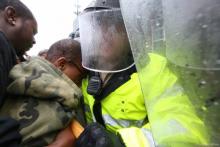
“Get the word out. Teach all these things. And don’t let anyone put you down because you’re young. Teach believers with your life: by word, by demeanor, by love, by faith, by integrity.” –1 Timothy 4:12 (The Message)
In our recent book Forgive Us: Confessions of a Compromised Faith, Mae Cannon, Lisa Sharon Harper, Soong-Chan Rah, and I call the American church to a posture of repentance due to all the times we have not only been on the wrong side of history, but on the wrong side of God.
As an organizer and director of the AMOS Project in Cincinnati, I’ve discovered that a humble spirit of repentance is critical to powerful work around racial and economic justice. There can be a strong temptation to replay colonialism by having all the answers and believing we are God’s gift to the oppressed. We white evangelicals are particularly susceptible to this arrogant path. Humility and a repentant spirit are key to a healthy engagement and partnership in our work.
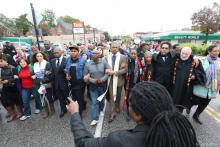
Thousands of people from around the country came to Ferguson, Mo., for a “weekend of resistance.” But for faith leaders it was a weekend of repentance. Twenty of us were arrested in Ferguson yesterday for an act of repentance.
I went to Ferguson as a faith leader but, in particular, as a white faith leader. Because the great disparity between how differently young black lives are treated in our criminal justice system than young white lives is a fundamental injustice that must not only be left to black faith leaders to raise up. Repentance must begin in the white Christian community for tolerating this offense to our black brothers and sisters and, ultimately, this offense to God. Let me be as honest as I can be. If white Christians in America were more Christian than white, black parents could feel safer about their children. It’s time for us white Christians to repent — turn around and go in a new direction.
Repentance is a powerful theme throughout the Bible. But its meaning is often not well understood. Repentance is not about being sorry or just feeling guilty. It is about turning in a new direction. The biblical word for repentance in the original Greek is metanoia, which means you are going in the wrong direction, and it’s time to turn right around.
In the case of Ferguson, repentance means more than merely acknowledging the tragic death of an unarmed 18-year-old African-African man named Michael Brown on Aug. 9 — shot and killed by a white police officer named Darren Wilson. Repentance means more than lamenting the loss of another young black man or being sympathetic to his grieving mother. True repentance means changing the direction of the practices and policies that led to his death and so many others.







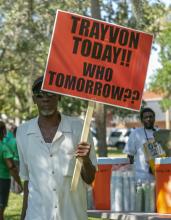
WE HAVE AMPLE reason to weep of late: war in Gaza, crisis in Syria, ISIS in Iraq, the slaying of five unarmed black men in one month at the hands of U.S. police officers, and the demise of congressional immigration reform.
Scripture calls us to cross over into the valley of lament at times such as these. Yet most of us are more comfortable on the plateau of rage or the plain of apathy.
I once led a training on lament and racial reconciliation. Twenty college students sat in the living room of a ministry house as I recited a lament from Jeremiah, the “weeping prophet”: “O that my head were a spring of water, and my eyes a fountain of tears, so that I might weep day and night for the slain of my poor people!” (9:1).
I spoke of the impact of racial injustice in our nation and on our campuses. I recounted slave narratives to the students—stories that had brought me to tears privately. Yet, when the last word was read, the students sat silent with glazed eyes staring back at me.
I didn’t get it. The whippings of human beings, the children separated from their mothers and fathers, the hands, feet, and lives lost in the midst of America’s darkest hours—these things happened. How could we not lament?
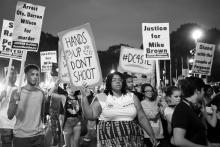
ON AUG. 9, Michael Brown, an unarmed black teenager, was shot to death by Ferguson, Mo., police officer Darren Wilson. A collective groan was let out across social networks—people began the lament “Not again.”
Just four days prior, John Crawford III, a 21-year-old black man, had been gunned down by police in a Walmart in suburban Dayton, Ohio, without warning, while shopping for a BB gun. A few weeks earlier, Eric Garner, an African-American man, was choked to death by a New York City police officer.
For young black men, each incident is a reminder of how easily our lives can be taken away by police aggression. For the people in Ferguson, however, over-policing is all too familiar. In a city where 67 percent of the residents are black, there are only three black police officers on a force of 53.
A 2013 report from the Missouri attorney general’s office revealed just how bad relations are between officers and black citizens. Out of the 5,384 traffic stops made last year by the Ferguson Police Department, 86 percent of them targeted black drivers. Black drivers were searched and arrested at nearly twice the rate of white drivers, although contraband was found at a rate 13 percent less than that of white drivers.
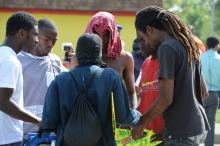
If, as many of the religions of the world affirm, there is a profound equality of dignity and worth between all human beings by virtue of their humanity alone, then what are we to make of a nation and its citizens who allow an entire group of people, a people once brutally enslaved and still actively oppressed, to continue to be stigmatized in ways that implicitly affirm their inferiority as a group and so allow too many of them to experience the devastating consequences of entrenched racial inequality? That nation and its citizens would stand accused of the greatest of injustices. That nation and its citizens would have a divine duty to end that injustice. The United States and we its citizens stand so accused today. Until we understand the imperative to eliminate racial inequality as an obligation grounded in ultimate reality, we will fail to understand the magnitude of our responsibility.
Whether the issue is wealth, health, incarceration, employment, or education, blacks as a group experience significantly disproportionate negative outcomes compared to whites. What accounts for this difference? Only two options are available. Significant racial inequality over time is explained either by forces external to the lives of black individuals (e.g., economic, legal, and social forces), or by the aggregate consequences of choices made by these individuals. Unless one concludes that racial inequality is entirely explained by forces external to the lives of black people, one is forced to conclude that there is something inferior about blacks as a group that causes them persistently to make more bad life choices than whites as a group.
At this point, some will object that some black people do indeed make bad choices that lead to bad outcomes. But so do some white people. The question is what accounts for the differences in the proportion of bad outcomes?


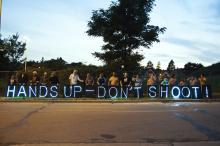
Dr. King said: a “riot is the language of the unheard.”
What happens when folks do not feel like their voices are being heard?
They shout louder.
Rioting is what almost happened in Ferguson, and all of us who live in fragile neighborhoods with a backdrop of deep racial injustice need to pay attention.
In Ferguson, a close-knit community was devastated by yet another injustice. They wanted to be heard. But as peaceful marches began, they were met with unprecedented force.
Tears were met with teargas.
It was as if authorities were putting their hands up over their ears. So the people shouted louder – and the world began to pay attention.
At a fragile moment when emotions were running high, the people of Ferguson had to choose between rioting and nonviolent direct action in the streets. A very small group (many of them arguably out-of-state activists) resorted to some forms of property damage. And it caught the media’s attention.
Some might say it hijacked the headlines.
But that is not how I will remember Ferguson.
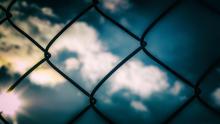
I walked across the school yard and through the ominous painted doors of St. Athanasius Elementary School for the first time. My mother and I had walked hand in hand the long city block from home to the school, across the school yard, through the entrance, down the hallway, heels now echoing against linoleum and lockers as the smell of chalk and mimeographed copies wafted from each classroom we passed.
We entered my second-grade classroom where I was greeted by the teacher who told me to take my seat four heads from the front. That seat was my second home for half of every day for a year.
I had high hopes for second grade. At the very least, I hoped it would be safe. It wasn’t.
The girl who sat behind me demanded 25 cents per day to be my friend — or else. But worse, the white woman charged with teaching our classroom full of African-American children ruled us as if we were in her military camp … or worse… prison.
My teacher once punched me in the back because I forgot to hand in an assignment — in second grade.
Now take that single act of aggression and magnify it: a punch in the back becomes a suspension, an expulsion, or an arrest. Then systematize it. Call it a “Zero Tolerance” policy and spread it across 90 percent of schools in the United States. Then apply the policy inequitably, such that African-American children are punished at higher rates and more severely than white children. That is what happened when the culture of severe punishment promoted by the Tough on Crime movement permeated education systems throughout the 1990s.
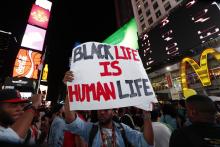
One month ago, the city of Ferguson, Mo., was violently shaken by the shooting death of an unarmed black man whose name is Michael Brown, Jr.
This is not the first time we’ve stood in this place. Michael Brown has been added to the roll call of unarmed black people killed by those hired to protect and to serve. His name joins the names of:
John Crawford , an unarmed Ohio man gunned down inside of a Walmart while examining a toy gun sold in the store.
Eric Garner , an unarmed New York man killed, after stating several times that he was having difficulty breathing, by an officer using an illegal choke hold.
Sean Bell , an unarmed New York man shot multiple times outside of the venue for his bachelor party the night before his wedding.
Oscar Grant , an unarmed Oakland man who was handcuffed, face down, before he was fatally shot.
And so many more black lives, both male and female, ended by the reflexes of a legal system designed to police some and protect others.
So why did the killing of Michael Brown, Jr. ignite such a firestorm of rage in a region and a nation where slain black bodies are commonplace?
This is not one of those neighborhoods that cause political analysts to pontificate over “how something so tragic could happen here.”
These are not deaths that leave communities and congregations struggling to find deeper meaning and psychological factors that might have contributed to the tragic loss of life.
As a matter of fact, since the death of Michael Brown, there have been two killings of black men with documented mental challenges, Ezell Ford of Los Angeles and Kajieme Powell, killed only a few miles from the site of Michael Brown’s death. Yet there have been no roundtable discussions of the role of mental illness in our society sparked by these deaths.
What made Michael Brown’s death different?